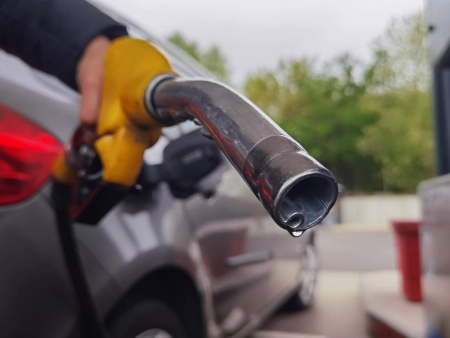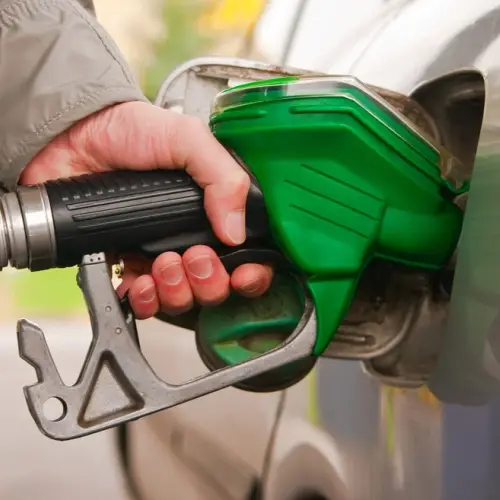
Gasoline is a liquid fuel derived from petroleum, used primarily in internal combustion engines, such as those in automobiles.
This compound, which is part of our daily lives, is actually a complex mixture of hydrocarbons, which are molecules composed only of hydrogen and carbon.
Gasoline has been specifically designed to be an efficient and suitable fuel for high-performance engines, meaning its physical and chemical properties have been fine-tuned and controlled through refined processes.
Throughout this article, we will explore both the physical and chemical properties of gasoline, including its volatility, flash point, and its ability to release energy when burned.
To fully understand its characteristics, we must first review its composition and then detail each of the relevant properties.
Composition of gasoline
Gasoline is composed of hydrocarbons ranging in length from five to twelve carbon atoms. Some of these common hydrocarbons are heptane, octane, and various aromatic compounds such as benzene, toluene, and xylene.
The combination of these components results in a mixture that can vary from one type of gasoline to another. Gasolines with a higher octane number, for example, contain a higher proportion of branched hydrocarbons and aromatic compounds, which improve their ability to resist detonation in engines.
The hydrocarbon mixture can also be modified with certain additives , which serve to optimize fuel performance and reduce polluting emissions.
Some of these additives include oxygen compounds, such as ethanol, which can improve gasoline combustion and reduce the formation of pollutants such as carbon monoxide.
Physical properties of gasoline
1. Density
The density of gasoline is an essential aspect for its storage and for estimating its performance in engines. This density varies depending on its composition, but is generally between 0.71 and 0.77 g/cm³.
Unlike water, gasoline is less dense, which explains why it would float if both substances were mixed in a container.
Density also influences how much energy a given volume of gasoline can store, known as energy density.
A gasoline with a higher density can generally store more energy in the same volume, which can be advantageous in terms of fuel range in a vehicle.
2. Volatility
 Volatility is one of the most relevant properties of gasoline, as it describes its ability to convert to a gaseous state.
Volatility is one of the most relevant properties of gasoline, as it describes its ability to convert to a gaseous state.
Gasoline is highly volatile, which is favorable for its operation in internal combustion engines. This volatility allows it to vaporize easily at engine operating temperatures, making it easier to mix with air in the carburetor or fuel injection system.
However, excessive volatility can also be problematic, especially in hot climates where gasoline can evaporate quickly, potentially causing pressure problems in fuel storage systems and loss of efficiency.
3. Flash Point
Flash point is the minimum temperature at which gasoline vapors can ignite in the presence of an ignition source.
This point is in the range of -40°C to -45°C, indicating that gasoline is extremely flammable even at low temperatures. This characteristic is key to its use in engines, where rapid and controlled ignition of the air-fuel mixture is essential for engine operation.
4. Viscosity
Gasoline has a low viscosity, which means it is a fairly thin liquid.
This low viscosity level allows gasoline to be pumped easily through the passages of an engine's fuel system. In addition, the low viscosity facilitates the atomization of gasoline when it is injected into the engine, which is important for efficient combustion.
Chemical properties of gasoline
1. Combustion Behavior
The combustion of gasoline is an exothermic reaction, meaning it releases a large amount of energy in the form of heat. The simplified equation for the combustion of hydrocarbons in gasoline is as follows:
C 8 H 18 +O 2 →CO 2 +H 2 O+energy
Under ideal conditions, complete combustion produces carbon dioxide (CO₂) and water (H₂O). However, in practice, combustion is never completely efficient, and can result in byproducts such as carbon monoxide (CO), unburned hydrocarbons, and oxides of nitrogen (NOₓ), especially in older or poorly tuned engines.
Combustion efficiency and quality depend on the air-fuel ratio in the engine. When the mixture is right, gasoline burns efficiently, generating maximum power and reducing pollutants.
2. Octane number
 The octane number is a measure of a gasoline's resistance to detonation or "knocking" in the engine, which occurs when the air-gasoline mixture spontaneously ignites before the ignition spark.
The octane number is a measure of a gasoline's resistance to detonation or "knocking" in the engine, which occurs when the air-gasoline mixture spontaneously ignites before the ignition spark.
The higher the octane number, the more resistant the fuel is to detonation. Regular gasoline typically has an octane rating of around 87, while high-performance gasolines can reach octane ratings of 91 or higher.
This number is important because it allows high compression engines to operate without the risk of premature detonation, which is essential for performance in sports car or high horsepower engines.
3. Reactivity and stability
Gasoline is relatively stable at room temperature, but it can react with oxygen in the air over time, especially when exposed to sunlight or heat.
This exposure can cause gums and resins to form in gasoline, which is known as "aging" of the fuel. To reduce this risk, antioxidants are added to gasoline, which help preserve its stability during storage.
Additionally, gasoline can react with some materials, such as certain plastics and rubbers, which can cause degradation in fuel system components if they are not specifically designed to withstand its contact.
Impact of additives on gasoline properties
Additives are additional components that are mixed into gasoline to improve its combustion properties, stability, and cleanliness. Some of the most common additives include:
- Oxygen additives – such as ethanol or MTBE, which help reduce the formation of pollutants and improve combustion efficiency.
- Detergents – These are added to prevent deposit build-up on fuel injectors and valves.
- Storage stabilizers : such as antioxidants, which prevent the formation of gums and resins.
These additives can slightly modify the physical properties of gasoline, such as its density or volatility, although the overall impact is usually minor compared to the performance and emissions reduction benefits.